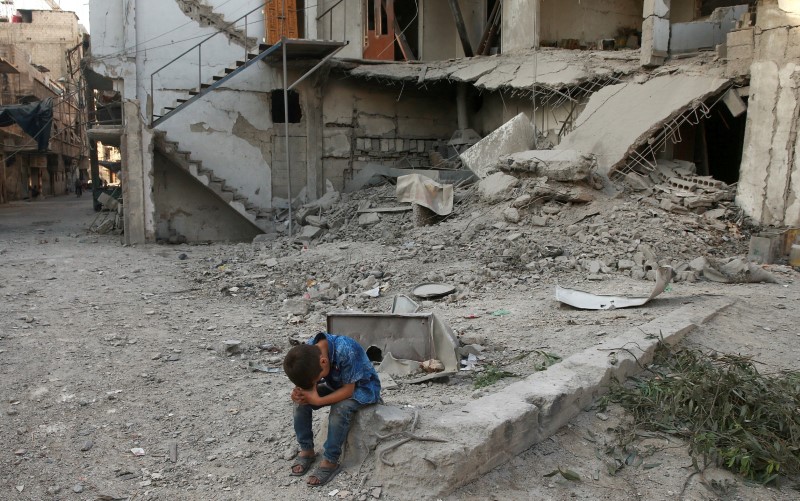By Tom Miles
GENEVA (Reuters) - The United States, Saudi Arabia, Britain, France and other nations are demanding the U.N. Security Council takes action to ensure aid convoys reach millions of needy Syrians, according to a letter seen by Reuters on Wednesday.
In a rebuke to Syrian President Bashar al-Assad and his allies Russia and Iran, the letter signed by 14 heads of mission in Geneva raised "serious concerns" about the implementation of seven Security Council resolutions on humanitarian access.
"We remain extremely concerned that the United Nations is being excluded from sending humanitarian convoys to besieged and hard-to-reach areas inside Syria," said the letter, dated July 24 and addressed to the Security Council President, Chinese Ambassador Liu Jieyi.
"The trend has worsened significantly in recent months," the signatories said, adding that since April only two U.N.-supported convoys had been able to access territory besieged by forces loyal to Assad.
Nobody at the Syrian mission in Geneva responded to phone calls and an emailed request for comment on the letter, an apparent expression of frustration at the U.N. process of trying to get aid into Syria.
But a Russian diplomat said the letter was uncalled for and unexpected, and that the issue should have been raised discreetly via the office of the U.N. envoy to Syria.
"We consider this as a provocative move that will not help the humanitarian situation in Syria," the diplomat said. "The situation is not a happy one but it's not as dire as some countries want to portray it."
U.N. humanitarian spokesman Jens Laerke said the U.N. was aware of the letter but had not officially received it.
Although the violence in Syria has fallen off since Russia, Iran and Turkey launched a plan for de-escalation zones in May, the lessening in fighting has not translated into more aid deliveries.
The United Nations says 540,000 people in 11 locations are still besieged, mostly by Assad's forces, while 4 million Syrians are hard to reach with aid. Only six "hard-to-reach" areas had received aid since April.
"Although these represent important deliveries for the hundreds of thousands who received critical aid, it falls far short of what the U.N. has requested and is capable of and ready to deliver," Laerke said.
Forces loyal to Assad have taken over several besieged zones this year after cutting off their food supplies for months.
Many people trapped in such sieges have been evicted, often going to the northwestern province of Idlib, which this week fell under the control of Hayat Tahrir al Sham, a jihadist alliance led by al Qaeda's former Syrian branch.
The United Nations has frequently called on "all parties" to respect humanitarian law and to allow aid access, but its pleas tend to focus on the suffering of civilians, without naming and shaming any specific warring side.
The letter quoted Council resolution 2139, from February 2014, which urged the Syrian authorities in particular to allow "rapid, safe and unhindered humanitarian access" for aid convoys, and promised the Council would "take further steps in the case of non-compliance".
It is likely to come up for discussion on Thursday when the Security Council holds a scheduled meeting on Syrian aid, and when countries with influence in the six-year Syrian conflict meet in Geneva to discuss the humanitarian situation.
The letter's signatories also include Turkey, Qatar, Japan, Australia, the European Union, Germany, Spain, the Netherlands, Canada and Italy.
They do not include Russia or China, veto-wielding members of the U.N. Security Council which have frequently blocked resolutions that sought to condemn Assad.

The signatories asked Liu "to raise urgently this vital issue" at the next U.N. Security Council meeting, recalling the Council's 2014 resolution which said it would "take further steps in the case of non-compliance".